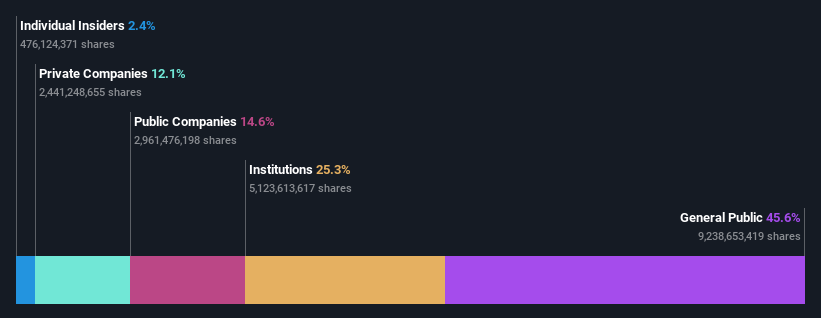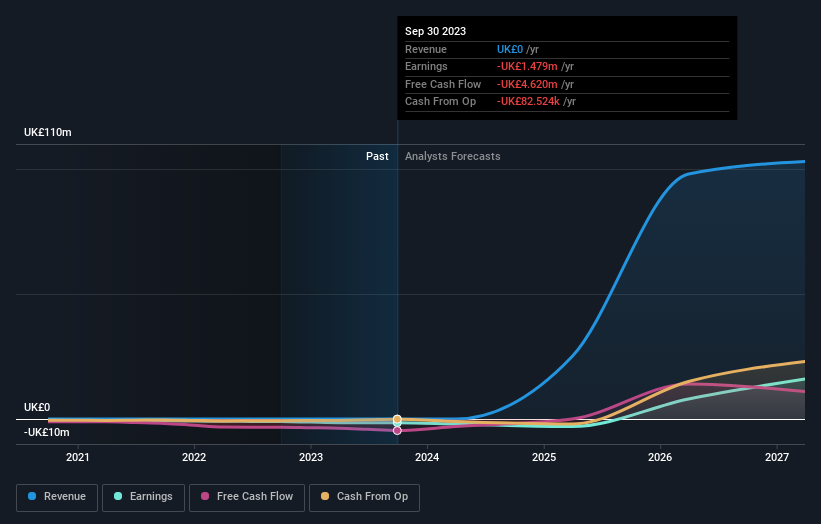- United Kingdom
- /
- Metals and Mining
- /
- AIM:KOD
Kodal Minerals PLC's (LON:KOD) market cap touched UK£91m last week, benefiting both retail investors who own 46% as well as institutions

Key Insights
- Kodal Minerals' significant retail investors ownership suggests that the key decisions are influenced by shareholders from the larger public
- A total of 11 investors have a majority stake in the company with 50% ownership
- Institutions own 25% of Kodal Minerals
If you want to know who really controls Kodal Minerals PLC (LON:KOD), then you'll have to look at the makeup of its share registry. We can see that retail investors own the lion's share in the company with 46% ownership. Put another way, the group faces the maximum upside potential (or downside risk).
While retail investors were the group that reaped the most benefits after last week’s 15% price gain, institutions also received a 25% cut.
Let's take a closer look to see what the different types of shareholders can tell us about Kodal Minerals.
View our latest analysis for Kodal Minerals

What Does The Institutional Ownership Tell Us About Kodal Minerals?
Institutions typically measure themselves against a benchmark when reporting to their own investors, so they often become more enthusiastic about a stock once it's included in a major index. We would expect most companies to have some institutions on the register, especially if they are growing.
Kodal Minerals already has institutions on the share registry. Indeed, they own a respectable stake in the company. This can indicate that the company has a certain degree of credibility in the investment community. However, it is best to be wary of relying on the supposed validation that comes with institutional investors. They too, get it wrong sometimes. If multiple institutions change their view on a stock at the same time, you could see the share price drop fast. It's therefore worth looking at Kodal Minerals' earnings history below. Of course, the future is what really matters.

Hedge funds don't have many shares in Kodal Minerals. Looking at our data, we can see that the largest shareholder is Hainan Mining Co., Ltd. with 15% of shares outstanding. In comparison, the second and third largest shareholders hold about 12% and 7.3% of the stock. Furthermore, CEO Bernard Aylward is the owner of 1.2% of the company's shares.
After doing some more digging, we found that the top 11 have the combined ownership of 50% in the company, suggesting that no single shareholder has significant control over the company.
While it makes sense to study institutional ownership data for a company, it also makes sense to study analyst sentiments to know which way the wind is blowing. There is some analyst coverage of the stock, but it could still become more well known, with time.
Insider Ownership Of Kodal Minerals
The definition of an insider can differ slightly between different countries, but members of the board of directors always count. Management ultimately answers to the board. However, it is not uncommon for managers to be executive board members, especially if they are a founder or the CEO.
Insider ownership is positive when it signals leadership are thinking like the true owners of the company. However, high insider ownership can also give immense power to a small group within the company. This can be negative in some circumstances.
Our most recent data indicates that insiders own some shares in Kodal Minerals PLC. It has a market capitalization of just UK£91m, and insiders have UK£2.1m worth of shares, in their own names. It is good to see some investment by insiders, but we usually like to see higher insider holdings. It might be worth checking if those insiders have been buying.
General Public Ownership
The general public-- including retail investors -- own 46% stake in the company, and hence can't easily be ignored. While this size of ownership may not be enough to sway a policy decision in their favour, they can still make a collective impact on company policies.
Private Company Ownership
Our data indicates that Private Companies hold 12%, of the company's shares. It might be worth looking deeper into this. If related parties, such as insiders, have an interest in one of these private companies, that should be disclosed in the annual report. Private companies may also have a strategic interest in the company.
Public Company Ownership
Public companies currently own 15% of Kodal Minerals stock. It's hard to say for sure but this suggests they have entwined business interests. This might be a strategic stake, so it's worth watching this space for changes in ownership.
Next Steps:
While it is well worth considering the different groups that own a company, there are other factors that are even more important. For instance, we've identified 3 warning signs for Kodal Minerals (1 is a bit unpleasant) that you should be aware of.
But ultimately it is the future, not the past, that will determine how well the owners of this business will do. Therefore we think it advisable to take a look at this free report showing whether analysts are predicting a brighter future.
NB: Figures in this article are calculated using data from the last twelve months, which refer to the 12-month period ending on the last date of the month the financial statement is dated. This may not be consistent with full year annual report figures.
Valuation is complex, but we're here to simplify it.
Discover if Kodal Minerals might be undervalued or overvalued with our detailed analysis, featuring fair value estimates, potential risks, dividends, insider trades, and its financial condition.
Access Free AnalysisHave feedback on this article? Concerned about the content? Get in touch with us directly. Alternatively, email editorial-team (at) simplywallst.com.
This article by Simply Wall St is general in nature. We provide commentary based on historical data and analyst forecasts only using an unbiased methodology and our articles are not intended to be financial advice. It does not constitute a recommendation to buy or sell any stock, and does not take account of your objectives, or your financial situation. We aim to bring you long-term focused analysis driven by fundamental data. Note that our analysis may not factor in the latest price-sensitive company announcements or qualitative material. Simply Wall St has no position in any stocks mentioned.
About AIM:KOD
Kodal Minerals
Engages in the exploration and evaluation of mineral resources in the United Kingdom and West Africa.
Flawless balance sheet moderate.
Market Insights
Community Narratives


